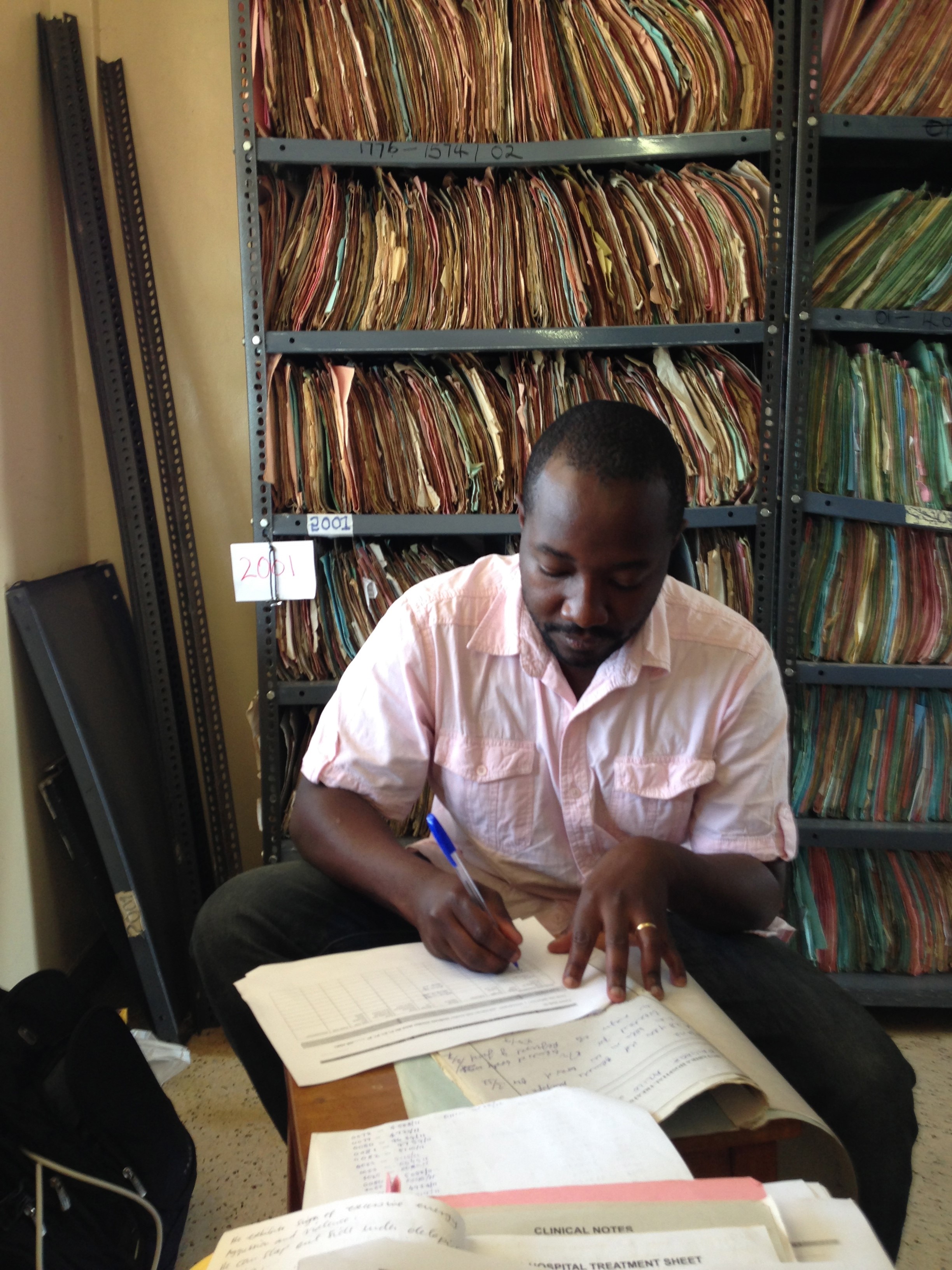Research is underway to improve mental health care in Uganda, thanks to an endowed fellowship created by Andy Stergachis and his wife, JoAnn. Stergachis, now director of the Global Medicines program at the School of Public Health, spent two months in Uganda in 2006 during the country's response to the HIV/AIDS crisis.

Andy and JoAnn Stergachis in Uganda in 2006
After that experience, the couple decided to support health sciences graduate students working on public health projects in developing countries through the Stergachis Endowed Fellowship for International Exchange. Solomon Lubinga was recently identified by the selection committee as the very first recipient of this fellowship.
Lubinga, a PhD student in the Pharmaceutical Outcomes and Policy Program in the Department of Pharmacy, said he will try to quantify the economic burden of mental health in Uganda by looking at patterns of treatment, particularly for schizophrenia, and its direct costs. "We want it to serve as a basis for developing a series of policy studies that ultimately seek to improve mental health care," he said. Lubinga will be based at the national referral mental hospital in Uganda's capital, Kampala, using medical records to help estimate the burden of mental illnesses.

Solomon Lubinga
Uganda only has about 26 psychiatrists for a country of 37 million, according to Lubinga. Bipolar depression is the leading cause of mental illness in Uganda, he said, followed by schizophrenia and the other schizoaffective disorders. "A host of studies have shown that if people have, say, HIV and a mental illness, they actually fare much worse in terms of health outcomes and in terms of managing their medications," he added.
The seeds were sown to create the Stergachis Endowed Fellowship for International Exchange after Stergachis spent two months at Kampala's Infectious Disease Institute, Makerere University. "While I was there on sabbatical, I mentored PhD students and medical students and saw value in training the next generation," he said. The experience "had a tremendous impact" on him, he said, and he and his wife made many friends.
At the time of his sabbatical approval, Stergachis was interim chair of the UW's department of pathobiology. King Holmes, an infectious diseases specialist and now chair of the Department of Global Health, suggested Stergachis spend time in a low-income country. "At the time, I didn't know I would personally be embarking on focusing much of my own career in global health," Stergachis said.
The Burden of Mental Health
Mental health accounts for 14 percent of the overall burden of disease and disability in developing countries, according to research from the UW's Institute for Health Metrics and Evaluation.
Stergachis brings a unique perspective to his work. In 1998, he left his tenured job as chair of the UW's Department of Pharmacy to become vice president and chief pharmacist of a Seattle-area start-up, drugstore.com. "It was the dot-com heyday," said Stergachis, who left four-and-a-half years later to return to academia and public health.
"There is a connection there," Stergachis said, "because at drugstore.com, where I was Chief Pharmacist, we needed to think about scale-ability and the provision of medicines and pharmacy services on a large scale. That continues to be a theme as we think about distribution systems with the kind of work I'm doing now."
Today Stergachis directs the UW Global Medicines Program, which seeks to strengthen the supply and safety of essential medicines in resource-poor countries. He is also a professor epidemiology and global health and adjunct professor of pharmacy and health services. He was recently elected to the Institute of Medicine, was named editor-in-chief of the Journal of the American Pharmacists Association, and writes the Stay Well blog for Walgreen's.

Solomon Lubinga in the records department of Butabika Hospital in Uganda
Lubinga said that after the UW published its Global Burden of Disease study, he and his mentor, Joseph Babigumira, assistant professor of global health, discussed underserved areas where they might be able to have an impact. "We identified mental health, especially in developing countries," Lubinga said.
According to the GBD, mental health contributes roughly 14 percent of the burden for disability-adjusted life years (DALYs). "It ranks the about same as tuberculosis and HIV," Lubinga said. "It's a big thing." But it's also largely ignored. "Because of the focus on other diseases, mental health goes unnoticed. It's swept under the rug."
What drew Lubinga to Uganda?
"Basically, because I'm Ugandan," said Lubinga, laughing. "I mean, I thought it would be nice to get skills from here and contribute something to my home country."
Lubinga also received a Thomas Francis Jr. Fellowship, which is supporting his travel to Uganda and all of his in-country work there for four weeks. The Stergachis Fellowship supports Lubinga's research in Seattle through the end of the summer quarter.
Stergachis Endowed Fellowship for International Exchange
"To foster international exchanges and collaboration through the support of health sciences graduate students who work on public health projects in developing countries, preferably in Uganda."
"That will give him time to come back with data, analyze it, get his manuscripts out, and think about next steps," Stergachis said. Lubinga also will be working on other global health projects. One is an effort in Malawi to strengthen the supply chain of essential medicines through training pharmacy assistants and deploying them in extremely underserved settings. Lubinga has been working closely with Joseph Babigumira on developing a protocol for evaluating the impact of the program.
Lubinga also plans to analyze data with Babigumira on a project to understand the barriers to male circumcision on Kalangala Island in Lake Victoria, Uganda, where the prevalence of HIV is high. Recent studies in some African countries have linked male circumcision to lower rates of HIV transmission. Babigumira's circumcision study is funded by a small pilot grant from the School of Public Health designed to promote research on the emerging challenges of the 21st Century, part of the School's strategic plan.
"All of this is connected," said Stergachis, who was co-chair of the School of Public Healths's strategic planning process. "We recruited Joseph to faculty, Joseph recruited Solomon as a grad student. They're working together. I couldn't be happier."
